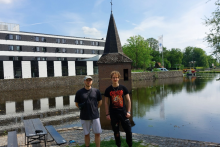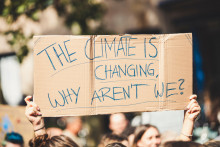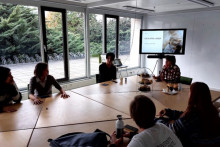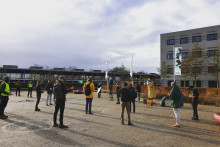What is your motivation for being a climate activist?
Staab: ‘It greatly annoys me, that so much about the causes and consequences of the climate crisis is so well known, but it is not acted upon. It is very difficult for me to just dismiss it: We know what is going to happen, but we sit there with this knowledge and do nothing. I take so much offence in knowing so much about the consequences and acting so little upon them. So many people just want to keep the goods they get from fossil fuels and pretend that there will be no large-scale system change either way. We have to choose a certain kind of system change that does not put the profits of the fossil fuel industry first, but the lives of the people.’
Blok: ‘I study chemical engineering and as part of this study we have a lot to do with the fossil fuel industry. In our study programme they always claim that they are committed to renewable energy and that they will play a big role in the energy transition, and that they are correct and ethical. If you research further, you will find that this is not true. I wonder why the university should work with a company that wants to maintain the current state while the world around us is changing.’
Do you feel like the movement receives a lot of support from other students?
Blok: ‘Yes, we get a lot of support from students within the movement. But I have never heard any opinion from other students outside the movement about the movement itself. We get passive support that doesn't translate into action, yes. So, we get mental support. They support us in thought, but not in action.’
Staab: ‘We don't hold that against the students, because I am very aware that there are significant obstacles to active support due to the structure of UT. Students invest a lot of time in their studies, and many have to work on the side. Therefore, there is a lot of pressure on many students that leaves no room for activism. I think the university should make an effort to give students more time to form a sustainable UT community.’
Do you feel like harsher forms of activism are important? Won’t harsher forms of activism not turn people away from the movement?
Blok: ‘Personally, I am all for more radical actions, as long as no one is hurt and no harm is done to people. I think something like an occupation is a good step. At the moment, the University Rebellion is conducting the sustainability dialogue with UT and we would like to keep this channel of communication open. When we finish the dialogue, we will see what the results are. I can imagine that there will be occupations if necessary, that depends on the willingness of the parties to work towards resolving the issues. Of course, we have to be careful not to polarise everyone. I can imagine that if you get too tough too quickly, you also get a lot of headwind.’
Staab: ‘There are different types of approaches. Some climate activist groups are more confrontational than others. This diversity of tactics plays a big role in the success of the climate movement in general. Emissions continue to rise even though we have only six years to act before the 1.5°C global warming carbon budget is reached. Personally, I am a rather non-confrontational person, not that I enjoy conflict, but again the issue is so urgent.’
Do you think it is realistic for UT to cut ties with the fossil fuel industry?
Blok: ‘It depends a bit on what kind of contracts the university has with the fossil fuel industry. That being said, I think there are definitely better options for UT. Breaking off the relationship would open up a whole world of new companies for the university to work with on sustainable technologies. Whether this is realistic is difficult to judge. Change is happening anyway, and now we are in a position where we can influence the paths of change. So let us choose a sustainable future. I also see studying at the university as preparation for the future. We are not only here to learn, but also to be prepared for the future. Many things will change in the future, especially in connection with the climate crisis, but that is hardly taken into account in our courses of study. Furthermore, these fossil fuel companies influence what and how research is done, so they influence this academic process, and I think as a university we want to keep it as pure and as close to knowledge as possible.’
Are you personally optimistic or pessimistic about the future when it comes to the climate crisis?
Blok: ‘I personally believe that movements like this offer some hope. But it's such a big issue that goes far beyond the sphere of influence of this university. Changes like allowing students to become more climate change aware people are very necessary, but even if you change that, it will take a while for those people to make a difference in our society. Personally, I am not so optimistic because I think there are many very influential actors who do not benefit from change. I think a lot of things about the status quo are very difficult to change.’
Staab: ‘We need to get people to do something about climate change, and I believe that when you act, you create hope. After actions, we always have exciting and positive conversations about climate change and activism. I have found that action can be inspiring and also give hope.’







